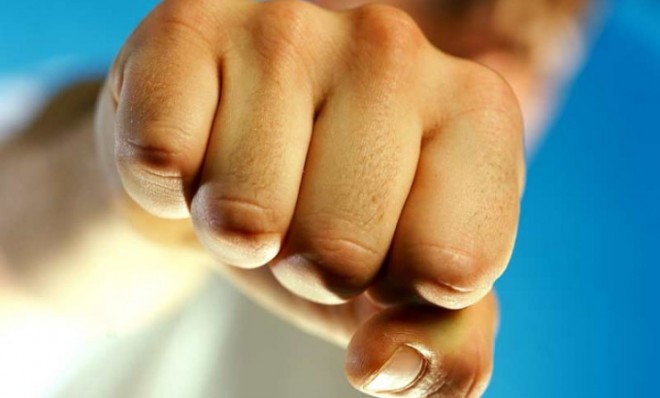Did the human hand evolve for fighting?
Apes don't throw punches. And now scientists think our ability to form an effectively clenched fist is no accident

A free daily email with the biggest news stories of the day – and the best features from TheWeek.com
You are now subscribed
Your newsletter sign-up was successful
The question: The human hand is quite unlike the appendages of our great ape cousins. Our palms are shorter, and our fingers are long and lithe. For years, evolutionary scientists believed humans developed this way because it helped our ancestors use tools better — gripping hammers and fashioning spears, for instance. But now, a group of researchers from the University of Utah suggests our hands evolved for more violent reasons. They sought to determine if a person's ability to form a closed fist was favored from an evolutionary standpoint — especially when you stop to consider that no other ape throws punches.
How it was tested: The team enlisted the help of 12 volunteers who had either boxing or martial arts experience. Participants were directed to hit a punching bag as hard as possible with different types of strikes, from closed fists to open-handed palms. The idea was to determine how much force the hand shape produced, clueing researchers in on how our hands evolved.
The outcome: Unsurprisingly, the open-handed palm strike and the closed first produced the same level of force. But clenched fists are much tighter, and can concentrate that force on a smaller surface area. That means more broken bones and a higher likelihood of tissue damage for the victim. "A punch delivers up for three times more force to the same amount of surface area as a slap," says the Telegraph. "And the buttressing provided by a clenched fist increases the stiffness of the knuckles fourfold, while doubling the ability of the fingers to deliver a punching force."
The Week
Escape your echo chamber. Get the facts behind the news, plus analysis from multiple perspectives.

Sign up for The Week's Free Newsletters
From our morning news briefing to a weekly Good News Newsletter, get the best of The Week delivered directly to your inbox.
From our morning news briefing to a weekly Good News Newsletter, get the best of The Week delivered directly to your inbox.
What it means: In the researchers' minds, the ability to inflict serious damage through a punch may have been a big evolutionary advantage for our ancestors. After all, our hand dexterity could have evolved without the fingers and palms getting shorter. Instead, our hands evolved to favor the clenched fist — namely our long thumbs, which lock the other fingers in and better protects the otherwise delicate bones of the hand.
What the experts say: "If you stop and look at what we know about the other species, we're a relatively violent group of mammals," says co-author David Carrier, an evolutionary biologist at the University of Utah. "Once that selection for climbing [trees] went away, there may also have been this selection for physical fighting — particularly in males. And these [hand] proportions would have increased how dangerous an individual was in those fights." When threatened, our first instinct is to clench our fists. That isn't a coincidence.
The takeaway: The hand's ability to manipulate intricate objects and instantly transform itself into a cudgel-like weapon is a uniquely human trait. "More than any other part of our anatomy, the hand represents the identity of Homo sapiens," write the researchers. "Ultimately, the evolutionary significance of the human hand may lie in its remarkable ability to serve two seemingly incompatible but intrinsically human functions."
A free daily email with the biggest news stories of the day – and the best features from TheWeek.com
-
 Local elections 2026: where are they and who is expected to win?
Local elections 2026: where are they and who is expected to win?The Explainer Labour is braced for heavy losses and U-turn on postponing some council elections hasn’t helped the party’s prospects
-
 6 of the world’s most accessible destinations
6 of the world’s most accessible destinationsThe Week Recommends Experience all of Berlin, Singapore and Sydney
-
 How the FCC’s ‘equal time’ rule works
How the FCC’s ‘equal time’ rule worksIn the Spotlight The law is at the heart of the Colbert-CBS conflict